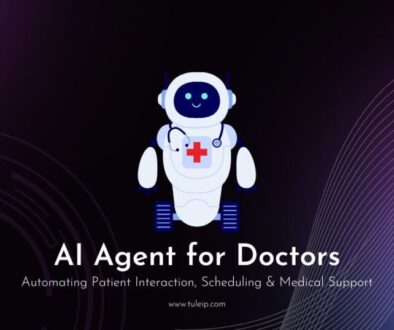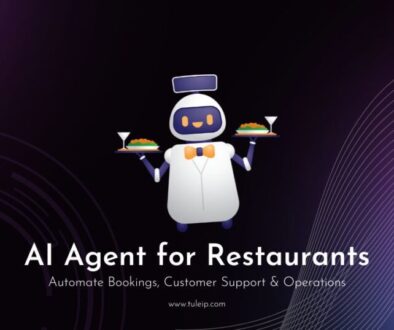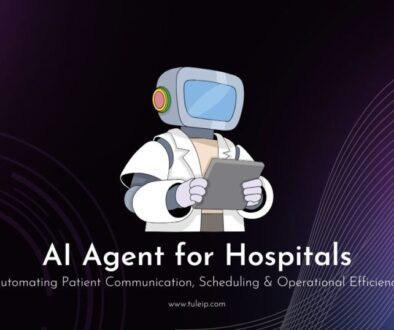AI Intelligent Agent: The Future of Autonomous AI Systems
Introduction
Artificial Intelligence (AI) is revolutionizing industries, and at the core of this transformation are AI Intelligent Agents—autonomous AI-driven systems capable of decision-making, problem-solving, and real-time interactions.
An AI Intelligent Agent operates with machine learning, natural language processing (NLP), and deep learning to analyze data, interact with users, and execute tasks with minimal human intervention. These agents are widely used in chatbots, automation, self-learning systems, and predictive analytics, making businesses more efficient and scalable.
In this blog, we will explore:
✔️ What is an AI Intelligent Agent?
✔️ How do AI Intelligent Agents work?
✔️ Key benefits and real-world applications
✔️ How businesses can leverage AI Intelligent Agents
✔️ The future of AI-driven automation
What is an AI Intelligent Agent?
An AI Intelligent Agent is a system that perceives its environment, processes information, and takes actions to achieve specific goals. It can learn, adapt, and make real-time decisions using advanced AI models and algorithms.
These agents can function in fully autonomous, semi-autonomous, or human-assisted modes, depending on the level of control required.
💡 Example:
- Autonomous Customer Support Chatbots that handle queries and resolve issues without human intervention.
- AI Trading Bots that analyze market trends and execute trades in real time.
- AI Assistants like Siri, Alexa, and Google Assistant that understand and execute voice commands.
How Do AI Intelligent Agents Work?
AI Intelligent Agents operate using a five-step framework:
1. Perception & Data Collection
📌 The AI agent gathers data from its environment through sensors, APIs, user inputs, and real-time data feeds.
✔️ Example: A customer service chatbot analyzes text queries.
✔️ Example: An autonomous vehicle collects data from cameras, GPS, and sensors.
2. Understanding & Processing
📌 The agent processes inputs using Natural Language Processing (NLP), Machine Learning (ML), and Deep Learning models.
✔️ AI interprets user queries, voice commands, or sensor data.
✔️ AI applies pre-trained models to extract meaning and context.
3. Decision-Making
📌 The AI agent selects the best course of action based on learned patterns and real-time inputs.
✔️ Uses predictive analytics to recommend solutions.
✔️ Can be rule-based (predefined logic) or self-learning (adaptive AI models).
4. Execution of Actions
📌 The agent performs actions based on the decision it made.
✔️ Virtual Assistants: Respond to user queries with personalized answers.
✔️ AI Robots: Adjust machinery processes based on detected anomalies.
5. Continuous Learning & Adaptation
📌 AI agents improve their accuracy and efficiency over time through feedback loops and continuous learning.
✔️ AI refines responses based on user feedback.
✔️ Machine Learning models adjust predictive recommendations.
Why Businesses Need AI Intelligent Agents
💡 Research shows that AI-driven automation can increase efficiency by 40% and reduce operational costs by 30%.
Key Benefits
✔️ 24/7 Automation – AI agents work without breaks, ensuring continuous operations.
✔️ Faster Decision-Making – AI processes data in real-time, leading to quicker insights.
✔️ Enhanced Customer Experience – AI-driven chatbots and virtual assistants provide instant support.
✔️ Improved Productivity – AI handles repetitive tasks, freeing up employees for strategic work.
✔️ Data-Driven Insights – AI analyzes patterns and predicts future trends for smarter business decisions.
✅ Industries Using AI Intelligent Agents:
✔️ Healthcare – AI-powered diagnostic systems and virtual health assistants.
✔️ Finance & Banking – AI-driven fraud detection and investment analytics.
✔️ E-commerce & Retail – AI-powered chatbots, recommendation engines, and automated support.
✔️ Manufacturing – AI-driven quality control and predictive maintenance.
✔️ Smart Homes & IoT – AI-powered voice assistants and home automation systems.
How to Implement AI Intelligent Agents in Your Business
🚀 Step-by-Step Guide:
1. Identify Key Use Cases
✔️ Define where AI can add the most value—customer service, automation, data analysis, etc.
2. Choose the Right AI Model
📌 Types of AI Agents:
✔️ Rule-Based AI – Follows pre-programmed rules (e.g., AI chatbots with FAQs).
✔️ Machine Learning AI – Learns from data and adapts (e.g., predictive analytics systems).
✔️ Reinforcement Learning AI – Self-improving AI (e.g., AI-powered robotics and automation).
3. Train AI with Data
✔️ AI models improve with structured and unstructured data.
✔️ Use historical data and user interactions to refine AI accuracy.
4. Integrate AI into Workflows
✔️ Deploy AI across web apps, chat systems, IoT devices, and business operations.
✔️ Ensure seamless integration with CRM, ERP, and automation tools.
5. Monitor AI Performance & Optimize
📊 Track AI success metrics:
✔️ Accuracy & response times
✔️ User satisfaction & engagement rates
✔️ AI-driven operational efficiency improvements
Best Practices for AI Intelligent Agents
✅ Ensure Data Privacy & Security – AI should comply with GDPR, CCPA, and other data regulations.
✅ Use AI for Assistance, Not Replacement – AI should augment human decision-making, not replace human oversight.
✅ Optimize AI for Multimodal Interactions – AI should support text, voice, and visual inputs.
✅ Train AI with Ethical Considerations – Ensure AI remains fair, unbiased, and transparent.
Future of AI Intelligent Agents
📢 AI-powered agents are evolving towards self-learning, fully autonomous AI systems.
Upcoming AI Trends:
🚀 Hyper-Personalization – AI will offer real-time tailored recommendations.
🧠 Emotionally Intelligent AI – AI will detect and respond to human emotions.
🔄 AI-Powered Autonomous Decision Systems – AI will manage end-to-end workflows with minimal human intervention.
📊 AI-Driven Predictive Analytics – AI will forecast business trends with extreme precision.
AI Intelligent Agents are not just the future—they are transforming businesses today!
Final Thoughts
AI Intelligent Agents are redefining automation, decision-making, and customer interactions across industries.
✔️ Automates repetitive tasks & decision-making
✔️ Enhances efficiency, accuracy, and response time
✔️ Drives data-driven insights & predictive analytics
💡 Want to integrate AI Intelligent Agents into your business? The future of AI-driven automation starts now! 🚀
FAQs
💡 What are the different types of AI Intelligent Agents?
✔️ Reactive Agents – AI with rule-based responses (e.g., basic chatbots).
✔️ Learning Agents – AI that adapts based on feedback (e.g., recommendation engines).
✔️ Autonomous Agents – AI that operates independently with real-time learning (e.g., self-driving cars).
💡 How do AI Intelligent Agents improve business efficiency?
✔️ Faster decision-making, 24/7 operations, and reduced human errors.
💡 Which industries benefit the most from AI Intelligent Agents?
✔️ Healthcare, finance, retail, manufacturing, smart homes, and e-commerce.
🚀 Want to learn more? Drop your questions below!
#AIIntelligentAgent #ArtificialIntelligence #AIforBusiness #MachineLearning #Automation #SmartAI #AIChatbot #AIInnovation #DigitalTransformation #AIinAutomation #AIForEfficiency
✔️ AI Intelligent Agent
✔️ AI-Powered Automation
✔️ Intelligent AI Systems
✔️ AI for Decision-Making
✔️ AI Chatbots and Virtual Assistants
✔️ AI-Driven Business Solutions
✔️ AI in Customer Support
✔️ AI-Powered Predictive Analytics
✔️ Autonomous AI Agents
✔️ AI for Digital Transformation
📌 AI-Powered Virtual Assistants
📌 Self-Learning AI Systems
📌 AI for Smart Business Solutions
📌 NLP-Based AI Agents
📌 Intelligent Automation with AI
📌 AI-Driven Customer Experience
📌 AI for Workflow Optimization
📌 AI Decision-Making Systems
📌 AI-Powered Business Intelligence
📌 Future of AI in Business



